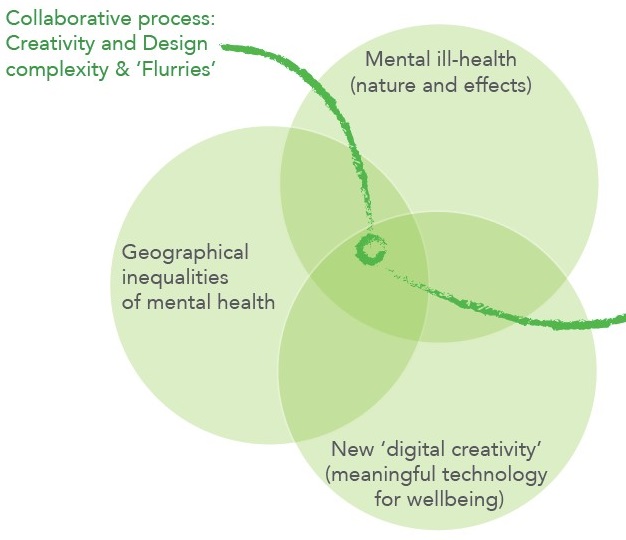 This programme embraced a novel, transdisciplinary approach using design complexity to create new modes of expression to address, communicate, and share the hidden challenges of people experiencing or affected by mental ill-health in remote and rural areas of Scotland, spanning from land-based to maritime communities. The programme explored whether an increased sense of personhood and collective wellbeing can develop through engagement with these invisible communities. Fundamental premises of this programme were grounded in evidence-based research and an assets-based approach to address three overlapping elements; mental ill-health, geographical inequities of mental health, and new "digital creativity" (meaningful technology for wellbeing).
This programme embraced a novel, transdisciplinary approach using design complexity to create new modes of expression to address, communicate, and share the hidden challenges of people experiencing or affected by mental ill-health in remote and rural areas of Scotland, spanning from land-based to maritime communities. The programme explored whether an increased sense of personhood and collective wellbeing can develop through engagement with these invisible communities. Fundamental premises of this programme were grounded in evidence-based research and an assets-based approach to address three overlapping elements; mental ill-health, geographical inequities of mental health, and new "digital creativity" (meaningful technology for wellbeing).
Personal experience is legitimate and deserving of recognition. People are valued as owners, curators and producers of new modes of expression of their own lived experience in a way that reflects their personhood while allowing for a shared social interaction with others.
"Creative Communities" sought to understand and explore ways in which the resilience of rural communities and the wellbeing of individuals can be enhanced if mental health issues were expressed, shared and addressed more widely. A "deficit model" of community inclusion was addressed by placing lived experience at the core of the programme, and enabling "voice" and visibility for invisible communities.
Using an evolved "Flourish" process enhanced through Complexity Design and perspectives from several disciplines, the team aimed to produce a range of expressive outcomes created by or with people living in rural areas of Scotland who may be experiencing or affected by mental health issues.
The overall purpose was to inform the Scottish Government Rural and Mental Health Policy development to contribute more widely to the Mental Health Agenda in Scotland, through reflecting the lived experience as expressed by citizens. The work also aimed to inform both the revised National Performance Framework (NPF) Outcomes, and the UN Sustainable Development Goals.